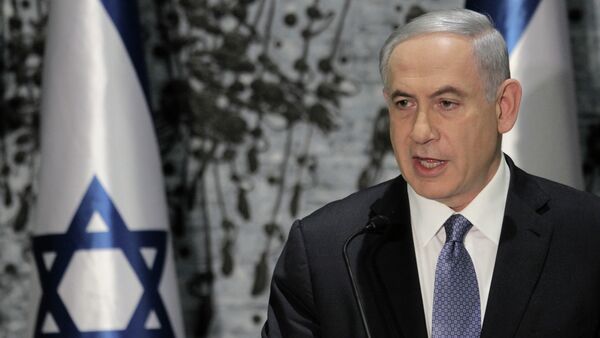"I am honored to notify you I have succeeded in forming a government, which I would like to present to parliament as soon as possible," Netanyahu wrote in a formal notice to President Rivlin.
"Israel now has a government," Naftali Bennett, head of the Jewish Home party announced on Wednesday, according to Reuters.
With a midnight deadline fast approaching, Netanyahu's Likud administration had struggled to negotiate with other parliament members over key cabinet positions.
The deal, made with United Torah Judaism, and Shas, and Kulanu parties, in addition to the Likud and Jewish Home parties, will provide Netanyahu with a coalition that will narrowly maintain control of parliament, with 61 seats out of 120. The prime minister has also expressed his goal of expanding the coalition.
"Sixty-one is a good number, 61-plus is better," he said, according to Reuters.
According to the deal, Jewish Home will be given control of the Education and Diaspora Affairs portfolio. MK Uri Ariel will become agriculture minister, and MK Ayelet Shaked will take over as justice minister.
Ayelet Shaked has faced controversy recently. Member of the Jewish Home party, she has been accused by other Israeli politicians of calling for genocide against Palestinians.
"Enough with the oblique references," she wrote in a Facebook post in 2014. "This is a war. Words have meanings. This is a war. It is not a war against terror, and not a war against extremists, and not even a war against the Palestinian Authority. These too are forms of avoiding reality. This is a war between two people. Who is the enemy? The Palestinian people."
All parties involved in the coalition lean to the right, with Jewish Home, in particular, likely to push for the expansion of Jewish settlements in the West Bank. This could heighten tensions between Israel and its Western allies, who have repeatedly urged Israel to stop building in occupied territories.
The new coalition may be likely to push for other legislation which could also go against the wishes of its allies. The Jewish Home party has drafted a bill which would restrict donations from foreign governments, including the US and EU members, to non-governmental organizations. Critics have called this an attempt to weaken pro-Palestinian groups.
Netanyahu has also reportedly ordered coalition members to vote in favor of new legislation which would tighten the government's grip on Israeli media. A clause in the new agreement would grant the communications minister the power to decide which media laws would be a priority for the coalition.
The Likud party has also proposed a "nation-state" law which would officially declare Israel a Jewish state. That proposal has already faced fierce opposition from President Rivlin, as well as the Israel's Arab minority.
Netanyahu won reelection in March, with his Likud party winning 30 seats.




